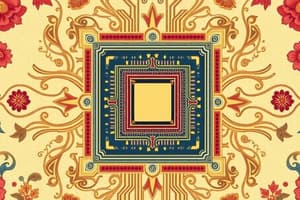Podcast
Questions and Answers
What is the main function of the CPU in a computer system?
What is the main function of the CPU in a computer system?
- Storing data
- Processing data (correct)
- Providing output to the user
- Communicating with other devices
Which of the following is NOT a type of computer system based on size and complexity?
Which of the following is NOT a type of computer system based on size and complexity?
- General Purpose Computer (correct)
- Personal Digital Assistants
- Micro Computer
- Mainframe Computer
What is the primary function of computer memory?
What is the primary function of computer memory?
- Processing data like the CPU
- Sending data to output devices
- Providing temporary storage for data and instructions (correct)
- Storing data long-term
Which component is responsible for data retrieval and long-term storage on a computer system?
Which component is responsible for data retrieval and long-term storage on a computer system?
What is the function of communication devices like routers and modems in a computer system?
What is the function of communication devices like routers and modems in a computer system?
Which component is known as the 'brain' of the computer system?
Which component is known as the 'brain' of the computer system?
How is the motherboard connected to other computer components?
How is the motherboard connected to other computer components?
Which component provides very fast but temporary storage for data that the CPU needs to access quickly?
Which component provides very fast but temporary storage for data that the CPU needs to access quickly?
What is the primary purpose of an input device in a computer system?
What is the primary purpose of an input device in a computer system?
Which component is responsible for transferring data between various computer components?
Which component is responsible for transferring data between various computer components?
Flashcards are hidden until you start studying
Study Notes
Main Computer Parts
- Hard Disk Drive (HDD): A permanent data storage device that doesn't delete data when the computer shuts down, featuring large capacity and faster performance compared to optical devices.
- CD-ROM Drive: A device used for reading CD media.
- Soundcard: A device used for sound creation and production through computer speakers.
- Graphics Card: A device responsible for image processing and displaying it on a monitor, featuring its own graphics processor and memory, with image quality dependent on the strength of these components.
Connectors or Ports
- Universal Serial Bus (USB): A port used to connect various devices such as mouse, keyboard, and USB memory.
- Parallel Port: A port used for connecting a local printer (LPT1 or LPT2).
- Network Port: A port used for connecting computers to a network.
- Firewire: A port used for connecting computers and audio-video devices (digital cameras, etc.).
Factors Affecting Computer Performance
- Processor Clock Speed: A factor affecting computer performance, measured in hertz (Hz).
- Amount of Installed RAM: A factor affecting computer performance, with more RAM resulting in better performance.
- Graphics Card: A factor affecting computer performance, with its memory and processor affecting image quality.
- Clock Bus: A factor affecting computer performance, with a faster clock bus resulting in better performance.
- Number of Running Applications: A factor affecting computer performance, with more running applications resulting in slower performance.
Measurement Units
- Hertz (Hz): A unit of measurement equal to one cycle per second.
Central Processing Unit (CPU)
- CPU (Processor): The central part of a computer, responsible for managing all other computer parts, monitoring their mutual communication, and performing arithmetic-logical operations.
- Processor Speed: Measured in hertz (Hz), with common units including megahertz (MHz) and gigahertz (GHz).
- Famous Manufacturers: Intel and AMD are two of the most famous manufacturers for personal computer processors.
CPU Components
- Arithmetic/Logic Unit (ALU): Performs arithmetic and logic operations.
- Instruction Control Unit (ICU): Coordinates the machine's activities.
- Memory (Registers): Special memory cells in the CPU used as temporary holding places.
Cache
- Cache: A small capacity memory that allows quick access to data, increasing the speed of communication between the processor and RAM by storing data from working memory.
ROM (Read Only Memory)
- ROM: A type of permanent, internal memory used solely for reading, containing BIOS (Basic Input/Output System) and start-up programs.
- ROM Features: ROM memory cannot be altered, and is not cleared when the power is turned off.
RAM (Random Access Memory)
- RAM: A working memory that stores analyzed data and programs while the computer runs, allowing reading and writing data, and deleting data when the computer shuts down.
Studying That Suits You
Use AI to generate personalized quizzes and flashcards to suit your learning preferences.




